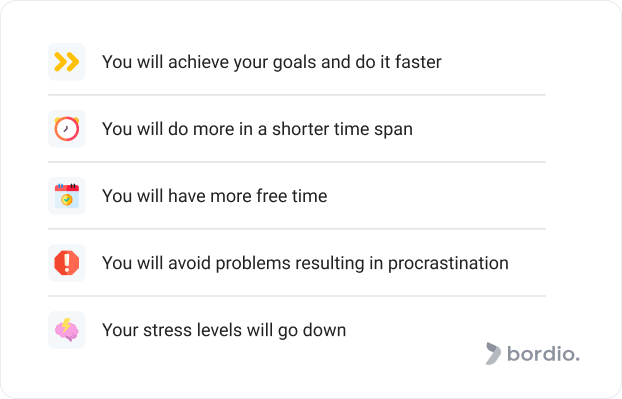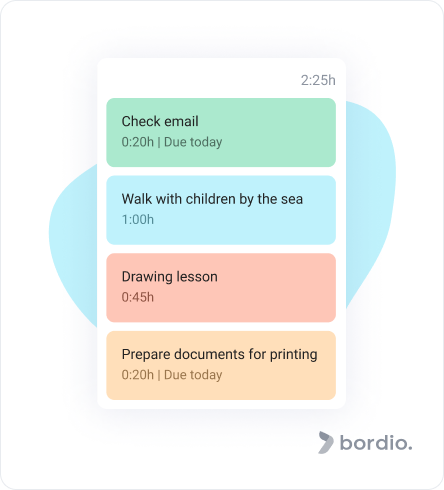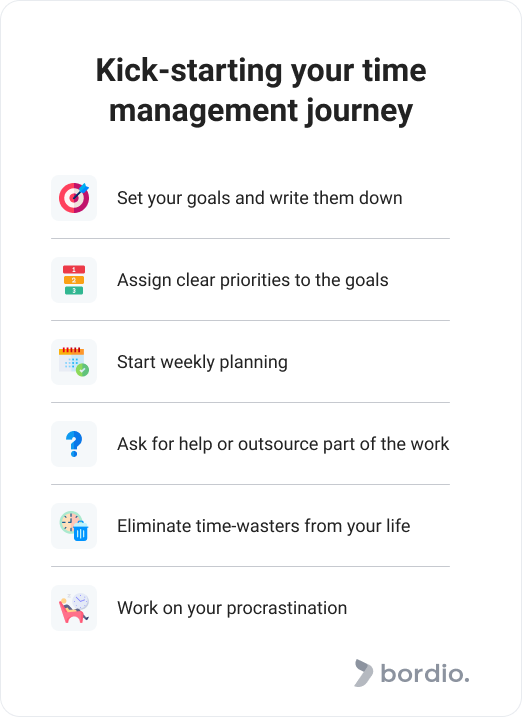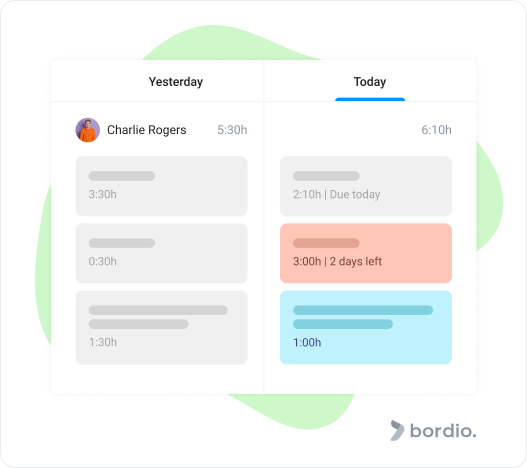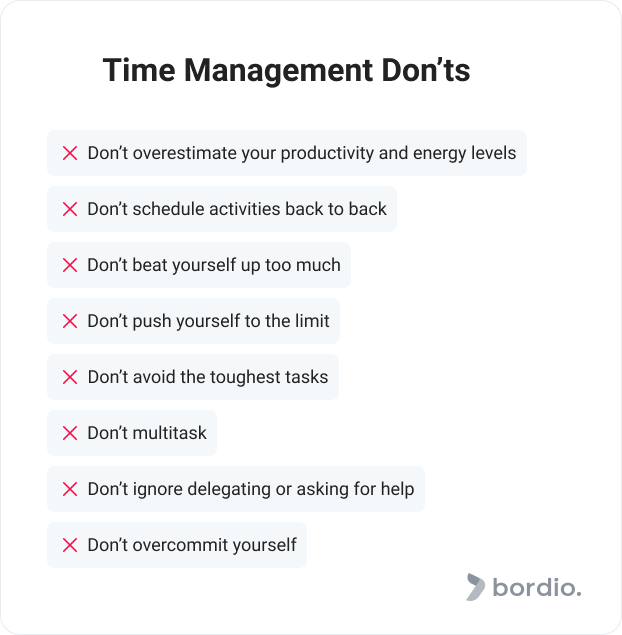Being busy has long been synonymous with being successful and living a full life.
In reality, being busy doesn’t equal being effective. And because life is full of amazing opportunities and there are only 24 hours in a day, it is crucial that we don’t just stay busy but actually achieve our goals and manage to do everything we’ve planned. Fortunately, team management software services are now available to help you and your work team offload work lists and work together.
Life is going at a much faster pace now, and dropping responsibilities to have more time is unrealistic. What we can do is work with our circumstances and upgrade our time management skills.
Definition of time management
Time management is (you guessed it!) a process of managing one’s time. The main idea is that we do not just go with the flow but take an almost scientific approach to it. Effective time management is about figuring out what needs to be done, prioritizing and scheduling the activities, and executing them in the online planners within the defined timeframes.
The end goal of time management is to complete more in the same time period and do it with less effort and less stress. Effective time management skills give a sense of liberation and control over personal life. By properly managing your time, you start working wisely, find time to build healthy habits, and achieve a better work life balance.
Key benefits of time management
Time management comes with countless benefits for personal and professional life.
You will achieve your goals and do it faster
There is hardly any person on planet earth who didn’t plan something and then never executed it. Many factors influence whether or not we accomplish something, but one of the top reasons for failure usually is the lack of proper time management. Think of all the side projects, hobbies, and trips that never happened. If you change your approach to time, primarily using a time planner app and setting your plans into it and, for example, to travel and work remotely, all your plans can become a reality.
You will do more in a shorter time span
Good time manager enables you to comfortably fit more activities in your days and spend less time executing them. It encourages and supports you in working smart. And you will no longer feel like you’ve wasted your time and didn’t achieve something you wanted to.
You will have more free time
Having more free time is everyone’s dream. An important element of time management is giving people new skills to spend less time on their obligations and more on their wants and wishes. There are different ways to free up time like delegating tasks or transferring certain responsibilities for example about markteng to marketing saas companies or even taking on an online part-time job that allows for greater flexibility and control over your schedule.
Whether you spend this extra time on productive activities (such as going to the gym) or getting enough sleep, it is good to have that choice. After all, time is a limited resource. Spending this limited source profitably is much easier when you use schedule makers. Just place your tasks in such a planner and track needed time; in conclusion, you will have a great tool making your planning done for you.
You will avoid problems resulting in procrastination
Missed deadlines and opportunities, lost professional reputation, excessive stress – all of that is no fun. And if we procrastinate or avoid the things we need to do, then unfavorable consequences will hit us sooner or later. If you intend to maintain good professional and personal relationships, you need to learn not to let others down. In order not to suffer from procrastination at work in the office and also at remote work use software to manage remote employees.
Your stress levels will go down
Even the most relaxed person is still stressed when they have a long to do list. It can be subconscious so we will not realize that we experience it, but still have it negatively affect our well-being.
Overall, effective time management brings different benefits depending on one’s circumstances, but it definitely reduces stress, increases the quality of your life, and makes it better.
Where to start on your time management journey
Acquiring proper time management skills is not an instant thing. We learn to manage time with the help of productivity techniques, ways to handle a to do list, and self discipline. But don’t you worry! You are not alone on this journey. We are here for you, and the tips below will help you create a positive cycle.
Set your goals
You are more likely to reach your goals if you define and write them down. Dedicate some time to thinking and brainstorming what your goals are, and make sure they are your own and don’t come from the outside. Once you have the goals written down in your daily planner in front of you, it is easier to work on them and keep them in mind. There is actually scientific proof that written goals are more likely to be achieved. Harvard did a study on their MBA students, and they found out that the 3% of students who had a habit of writing their goals down ended up earning ten times more than the 97% combined!
Set clear priorities according to these goals
Effective time management isn’t possible without prioritizing what needs to be done and making compromises. As much as we’d like to complete everything we’ve ever imagined, realistically, we will probably only do a part of it. And it’s vital to prioritize and finish the most important tasks.
Go through your to do list and honestly decide – what tasks do you really have to get on, what can be put on the back burner, and what should be dropped altogether. To help you decide which task goes to what category, you can ask yourself: does this bring me closer to my main goals?
Start your week with planning
Some people prefer to plan their week on Sundays, and some do it on Mondays. It doesn’t matter as long as it happens and you create a habit out of it. The free task tracker will help you with making new habits.
There is no need to spend hours on the process. Even a shorter period of 10-15 minutes can be enough to review your schedule, in simple schedule planner obligations and your wants. Plan your upcoming daily tasks according to your priorities and put them on the online calendar planner. If you have a lot on your plate, using an 80/20 principle or the Eisenhower matrix might make prioritization easier.
A good plan helps you stay calm, work smarter, avoid wasting time and missing deadlines. As Brian Tracy famously said: ‘Every minute you spend in planning saves 10 minutes in execution; this gives you a 1,000 percent Return on Energy.’
Ask for help and/or outsource
Doing everything by yourself is hard. You will end up feeling stressed and overwhelmed. Whenever a new task comes up, use internal filtering with a few questions:
- Should I complete it all by myself?
- What happens if I don’t do it? Are there any consequences for me?
- Does this task have an impact on my life?
- Can someone else do it with an acceptable quality level?
Remember that not every job needs to be done perfectly. Any experienced project manager will tell you that it is far more important to deliver work at all. Don’t invest too much time to produce little added value. Save time and energy! And don’t worry if you struggle with delegating. Hardly any person feels comfortable delegating when they only start this journey. It is vital to exercise it, again and again, to make it easier emotionally and to reach better results.
By the way, if you’re interested in project management in general, we have a list of the best project management books ready for you too.
Stop wasting your time
Time wasters are activities that consume significant amounts of your time but don’t bring any value. To avoid them, we first need to identify what our key time wasters are. Is it the never-ending notifications on the smartphone that make you check those social media apps again and again? Or maybe your colleagues who like to chat about random things? Once you know what’s holding you back, you can work on isolating yourself and limiting the negative influences.
Track your time using time management software and log all activities for a couple of weeks or a month. You are almost guaranteed to have unexpected results and insights into where your time really goes.
Stop procrastinating (or reduce it)
Have you ever found yourself watching television or browsing the internet for hours when you should have been cracking on the long list of tasks for the day? If you have, you are one of the millions of people suffering from procrastination. In fact, it’s fair to assume that we will not find one person on planet Earth who isn’t procrastinating occasionally.
There is a common belief that procrastination is just poor time management. This is not entirely true. Procrastination means putting off tasks until the very last minute with a full comprehension of possible financial penalties and other negative consequences.
Procrastination can be caused by countless factors, which we will go into detail about in a separate article. If you’ve followed the previous steps (setting up goals, planning, outsourcing), you will likely experience less desire to procrastinate.
To cut it further down, make a deal with yourself. Set a timer or a Pomodoro session for 15-25 minutes and plan to do productive work throughout this period. If it’s a big project you work on, the stress level might go up and cause poor decisions. With only 20-30 minutes of work required, there’s less pressure, and we often see greater productivity. The psychological trick here is that we get invested and encouraged to continue once we make the first few steps. ‘I am already in the flow, so I might as well just keep on working even though my Pomodoro session has finished’! And, of course, we recommend you use one of the top project management tools when working on big projects, as it increases your success chances.
Common mistakes with time management and how to avoid them
Time management is important. But the ability to manage time effectively, sadly, does not come naturally to most of us. We’ve prepared a list of mistakes that people often make as they learn to manage their time wisely.
- Overestimating your productivity and energy levels. As you go about your day, every following task that you work on will require more energy from you. If you can write one report in 3 hours, it rarely translates into 3 reports after 9 hours.
- Not leaving enough time in between your planned activities. Planning things back to back in your digital weekly planner is a shortcut to a disaster. A single meeting that runs late or a call that takes more time than anticipated can ruin your jam-packed schedule. So, even if you have tight deadlines and must finish tasks asap, always allow extra room for unexpected delays. Also, life just happens! New tasks come up out of nowhere, and your day plan should be able to accommodate them.
- Being too hard on yourself. Keep a positive mindset, even when things don’t go according to plan. Life happens, and unexpected things come up! Remember to reward yourself on milestones or upon reaching the goal. Beating yourself up has never helped anyone.
- Pushing yourself to the limit. Remember those people who decide to change their life suddenly, go on an extreme diet, exercise 6 days a week, and start waking up at 5 am every morning. We all know how that ends. Getting sustainable results takes longer, but it is the only way to acquire good time management skills and have them stick. Pace yourself, and don’t forget to take breaks. It’s okay if you are not always operating at full capacity. In fact, it’s not just fine – it’s healthy.
- Postponing the toughest tasks. Instead, ‘eat the frog’ (i.e., complete the scariest task first) and get instant relief, energy boost and endorphins. Getting it out of the way early in the day is a huge motivator. Not sure where to start? Check out the best time management books article for inspiration. We added the Eat the Frog best seller by Brian Tracey along with other great reads that teach you how to deal with urgent and not so pleasant tasks.
- Multitasking. Multitasking is not your friend. It is a myth that has been long debunked but is still around. There is actually no such thing as multitasking. Instead, our brain switches back and forth between many things that we work on. As a result, everything takes longer to finish, and there is a higher chance of making a mistake. So, you are better off focusing on one task at a time, checking your schedule daily planner.
- Trying to do everything by yourself. We’ve already touched on the delegation, but it’s worth repeating it here. People have a tough time letting go of control and tend to justify their fears. Trust us, you are not the exception, and there are ways to make delegation work for you. Maybe it is not as straightforward as you’d like, but there is always a way.
- Making too many commitments. Work life balance is a constant struggle. And if you are committing to too many projects, responsibilities, hobbies etc., you are not reducing stress and achieving more. Manage your time by learning to say No and re-evaluating your existing commitments before picking up something new. It’s hard to make a choice when more and more opportunities continue to present themselves. But learning to prioritize and kick out less vital projects out of your to-do list is an important skill that we should all exercise.
We hope that you will learn from others’ mistakes and not waste your precious time on the way to grasping the right time management skills and techniques.
Final thoughts on time management
The importance of time management should not be underestimated. It is inseparable from living an innately fulfilling life. Learning and using effective time management skills allows people to meet deadlines, reduce stress, work smarter. In other words, it helps them be in control of their own lives.
Time is a finite resource, and we better make the most of it. If you’d like to learn more tips and tricks on time management, check out the Productive At Home: Work and Personal Tips article.


